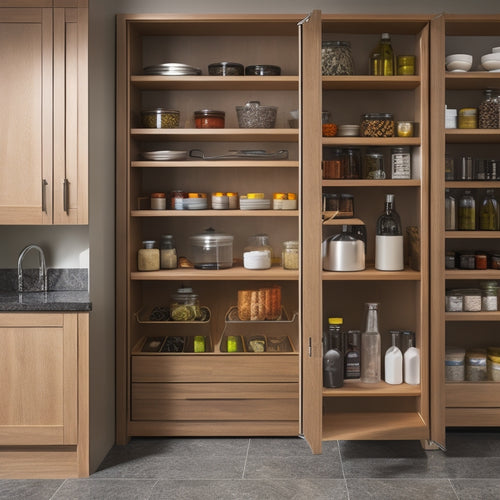
New York City's COVID-19 Food Pantry Guide
Share
New York City's COVID-19 Food Pantry Guide offers a thorough directory of food pantries, soup kitchens, and meal distribution programs across the five boroughs. The guide connects individuals and families in need with essential resources and support services during the pandemic. From Mott Haven to Melrose, Bronx, and Queens, local organizations offer food distribution programs, nutrition education, and community outreach initiatives. The combined efforts of these organizations guarantee vulnerable populations receive nutritious meals and critical support. Explore the guide to uncover a network of resources and services available to support New York City's communities during this challenging time.
Key Takeaways
• NYC's COVID-19 food pantry guide features a network of local food pantries and soup kitchens providing essential resources to vulnerable populations.
• Organizations like Abraham House, The Momentum Project, and Boom! Health offer food distribution programs and nutrition education in Mott Haven and Melrose.
• World Central Kitchen partners with local groups to distribute free meals in Queens, addressing food insecurity in the city.
• Bronx residents can access nutritious food through pantries like NY Common Pantry, St Jeromes Community Food Pantry, and St. Lukes Food Pantry.
• Community support and collaboration are crucial for the success of food relief efforts, reaching a wide range of individuals, including seniors and families in need.
Mott Haven Food Pantries
Mott Haven residents struggling with food insecurity can find relief at several local food pantries and soup kitchens that provide necessary sustenance during these challenging times. These organizations offer crucial food distribution programs, ensuring that those in need have access to nutritious meals.
Community outreach efforts are also in place, connecting residents with essential resources and support services. From Abraham House to The Momentum Project, a range of pantries and kitchens operate throughout the area, providing a safety net for vulnerable populations.
Melrose Food Pantries
In Melrose, a network of food pantries and soup kitchens provides crucial support to residents struggling with food insecurity, offering a range of services and resources to help individuals and families in need.
These organizations engage in community outreach, connecting with vulnerable populations and providing necessary assistance. Through hunger prevention initiatives, they aim to alleviate the burden of food insecurity, promoting health and well-being in the community.
From Boom! Health to Vineyard International Christian Ministries Food Pantry, each organization plays an essential role in addressing the pressing issue of hunger in Melrose. By providing access to nutritious food and essential resources, these food pantries and soup kitchens are instrumental in fostering a more food-secure community.
Queens Food Resources
World Central Kitchen, a non-profit organization, has partnered with local groups to distribute free meals throughout Queens, providing an essential lifeline to individuals and families struggling with food insecurity.
This initiative demonstrates the power of community partnerships in addressing the city's food crisis. Through this collaboration, World Central Kitchen has been able to expand its reach and provide critical support to those in need.
In addition to food distribution, the organization also offers volunteer opportunities for individuals looking to make a difference in their community. By working together, we can guarantee that no one in Queens goes hungry during this pandemic.
Food Pantry Directory
Located throughout the Bronx, a network of food pantries and soup kitchens offers necessary resources to individuals and families struggling to access nutritious food during the COVID-19 pandemic. These organizations provide critical support, ensuring that community members have access to food pantry availability and other essential services.
| Food Pantry | Availability |
|---|---|
| NY Common Pantry – Nourish | Mon, Tue, Thu, Fri 9:00am – 5:00pm, Wed 8:00am – 5:00pm |
| St Jeromes Community Food Pantry | 10 a.m. – 8 p.m. |
| St. Lukes Food Pantry | Fri 10-11 a.m. |
| Path of Blessings | Sat 12-3 p.m. |
Through community support, these organizations are able to provide essential services, demonstrating the power of collective action in response to crisis.
Bronx Food Pantries
Bronx residents struggling to access nutritious food during the COVID-19 pandemic can turn to a network of food pantries and soup kitchens that provide critical support and essential services. These organizations offer a range of services, including food distribution, community outreach, and nutrition education.
Many of these pantries and kitchens are located throughout the Bronx, making it easier for residents to access the help they need. From Mott Haven to Melrose, there are numerous options available, each with its own unique offerings and requirements.
COVID-19 Food Relief
In response to the COVID-19 pandemic, an extensive network of food relief programs has been established to provide emergency food assistance to those in need. This collective effort has enabled the distribution of essential food items to vulnerable populations, ensuring they have access to nutritious meals during these challenging times.
Community support has played a crucial role in the success of these programs, with local organizations and volunteers working tirelessly to facilitate food distribution. Through collaborative efforts, food relief programs have been able to reach a wide range of individuals, including seniors, families, and individuals struggling with food insecurity.
NYC Food Resources Map
Developing a detailed NYC Food Resources Map is essential for efficiently connecting individuals in need with nearby food pantries, soup kitchens, and other essential resources, thereby streamlining access to food assistance across the city.
To create an effective map, consider the following key components:
-
Food desert solutions: Identify areas with limited access to healthy food options and highlight community gardens and other initiatives addressing these gaps.
-
Emergency food distribution: Pinpoint locations offering emergency food assistance, such as soup kitchens and food banks.
-
Volunteer opportunities: Highlight organizations and initiatives relying on volunteers to help distribute food and provide support services.
- Community resources: Include additional resources, such as health clinics and social services, that can provide extensive support to those in need.
Frequently Asked Questions
What Are the Eligibility Requirements for Food Pantry Services?
Eligibility requirements for food pantry services typically include income verification, identification, and sometimes proof of residency, with specific requirements varying by pantry, such as age restrictions or financial guidelines.
How Do I Volunteer at a Local Food Pantry?
To volunteer at a local food pantry, search for opportunities online or contact pantries directly to inquire about training and availability. By volunteering, you can make a community impact, contribute to food security, and benefit from a sense of fulfillment and community engagement.
Can I Donate Food or Funds to a Specific Pantry?
To support local food pantries, consider donating non-perishable items or funds to specific organizations, exploring fundraising opportunities, and contacting pantries directly to inquire about their unique food donation options and needs.
What Are the Hours for Food Pickup and Distribution?
What are the best times for food pickup and distribution? For convenient access, many pantries offer morning slots on weekends and evening hours for food distribution, ensuring flexibility for those in need.
Are There Any Food Pantries That Cater to Specific Dietary Needs?
"Food pantries catering to specific dietary needs are available. Some offer gluten-free options, while others provide vegan-friendly choices. It is essential to research and contact individual pantries to determine their availability and accommodations."
Related Posts
-

Space-Saving Lazy Susan Cabinet Solutions
Space-saving Lazy Susan cabinet solutions can change those awkward corner spaces into organized storage wonders. You'...
-

Innovative Lazy Susan Storage Solutions
Innovative Lazy Susan storage solutions are a revolutionary advancement for any space, especially in kitchens. They m...
-

Spice Rack With Integrated Herb Garden
A spice rack with an integrated herb garden alters your kitchen into a culinary haven. You'll have fresh herbs at you...


